Unk was a very sick little ape. Both a veterinarian and a pediatrician, who usually treated only human children, were called in. The two doctors prescribed medicine, but agreed that the case looked hopeless. Such a delicate young animal, so far from home and his own kind, would surely die.
The Hoffmanns refused to give up. For six long and terrible weeks, they stayed with Unk around the clock, sleeping in shifts. Their patient needed medicine every two hours, food to maintain his strength, warmth, and above all, love. The treatment worked. To the surprise of nearly everyone, especially the two doctors, and much to the relief of the Hoffmanns, Unk recovered completely.
Healthy once again, Unk behaved like a totally different ape. He was ten months old, and he quickly made up for lost growing time by developing a huge appetite. Not only did he finish his own meals in record time, he also helped Gretchen and Dieter finish theirs. He became an accomplished thief, sneaking up on the humans at the table, snatching a potato or a handful of string beans from a plate, and swinging away to a high shelf where no one could reach him. The Hoffmanns didn’t really mind, but their friends did. They soon found that no one would have supper at their house any more.
Unk loved to play. The Hoffmanns’ small house became a substitute jungle, and their furniture soon showed the effects of the siamang’s running, jumping, swinging, tearing, and biting. It seemed that he never became tired, and he hardly ever slept. Unk sat still only for grooming sessions, which he loved. He offered his long arms to Gretchen or Dieter for grooming, and in return, insisted on grooming his foster parents. He seemed confused by the lack of hair on their arms, but seemed to regard their abundant head hair as a special consolation prize. Each day he spent twenty minutes or more grooming Gretchen’s hair, using his fingers gently but deftly, and making soft murmuring noises of contentment all the while.


